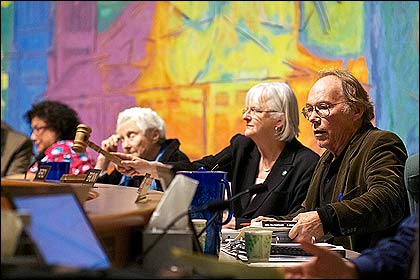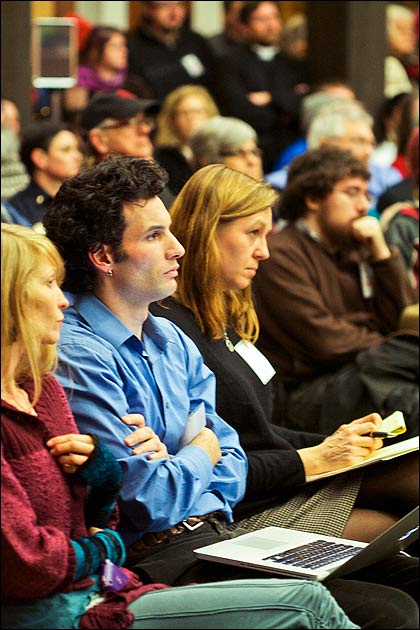
News Briefs: Whither Must Occupy Wander | Wolf Looks for Love? | Megaload Accident Stalls Haul | City Violates City Law, Again | Obama Signs on Horse Slaughter | Biz Beat | Activist Alert | War Dead | Lighten Up
News:
Transportation Plan
Billions to increase driving, sprawl, global warming
News:
Unfounded Investigation
County documents show a spending scandal
Slant: Short opinion pieces and rumor-chasing notes
Whither Must Occupy Wander?
 |
| Mayor Kitty Piercy calls for quiet at the City Council meeting. |
 |
|
Jamil Jonna and Lauren Regan of Occupy Eugene listen to the testimony. Photos by Camilla Mortensen. |
Occupy Eugene might be a camp for the “unhoused,” but it is as much a protest movement as ever, Occupiers told the Eugene City Council Dec. 12.
The council voted 7-1, with only Councilor Mike Clark in opposition, to delay a vote on what to do about Occupy until City Manager Jon Ruiz could meet with OE representatives. That Dec. 14 vote will occur after EW goes to press and only hours before the Dec. 15 camping permit for Occupy Eugene expires.
Prior to the City Council meeting, Ruiz outlined options for the camp from terminating the camping permit on Dec. 15 to extending the permit and providing transition services. After a work session, an hour of sometimes emotional public comments in a crowded public hearing and even more discussion, Councilor Alan Zelenka proposed an option that incorporated several of Ruiz’s suggestions. Zelenka suggested that the camp be allowed to remain for 45 more days, or another amount of time that would allow for transition from Washington-Jefferson Park and include options such as hiring a social services agency to provide coordination, support and oversight of a transition away from services that have been provided by the camp.
There was no second for Councilor Betty Taylor’s motion to extend the camping exemption unconditionally until May 15.
Occupy Eugene has been providing an estimated 1,000 meals a day as well as a place to sleep for those who would otherwise not stay somewhere like the Eugene Mission. Eugene does not currently have a “wet bed” facility that provides a place for chronically homeless people who use alcohol or drugs.
There was not enough time, according to Mayor Kitty Piercy, for all 70 people who had signed up to speak at the public hearing to have their say. The City Council heard testimony, limited to two minutes a person, for an hour. The council, with the exception of Clark, walked out of the room when the Eugene Peace Choir used two people’s testimony time to sing from the back of the room. When Clark was thanked for remaining in the room, he commented, “a little Facebook time is always good.”
The vast majority of the speakers were in favor of letting Occupy Eugene continue its protest and homeless, or as some Occupiers preferred, houseless, outreach. Pro-Occupy speakers ranged from those who live at the camp — including a woman named Lotus whose young daughter invited those in attendance to her birthday party at the camp on Friday — to Teri Ferguson, who identified herself as a middle class taxpayer who goes to church on Sunday.
Council members expressed concern over whether the camp as whole would agree to move, along with concerns over costs and health and safety issues. Water disposal from dishwashing was brought up by Councilor Pat Farr. Donna Riddle, who has a long history of working on social issues in Eugene and has volunteered as a dishwasher at the camp, said after the hearing that water is used and reused at the camp before being stored in a gray-water barrel and pumped out when the portable toilets are pumped each day.
An Elmira resident called the camp a “criminal infestation” and spoke of “repeated open sexual acts” to hoots of laugher from the crowd.
Ruiz noted in his memo that “within the last 7-10 days, conditions in the camp have been deteriorating more rapidly, requiring an increasing level of police resources.” But civil liberties attorney Lauren Regan said in her testimony, “Safety and health care issues are grossly overblown,” and said the site has become more safe over the last two weeks, not less so.
Occupier Scotty Perey said, “You call our village a mess! You want a mess? Our health care system is a mess. Our environment is a mess. The endless wars on which we bestow trillions of our oh-so-precious tax dollars on is a bloody mess. Our government and the corporations who promote all of these messes is a gargantuan mess.”
When those testifying made a statement the Occupiers agreed with, support was shown by putting hands in the air and twinkling fingers, a consensus signal used in general assembly meetings.
Eugene’s attempts to work with the Occupy camp and deal with the homeless issue that it has highlighted stands in contrast to many other cities that have controversially and sometimes violently cleared out the camps associated with the Occupy movement.
“Occupy Eugene has captured people’s imaginations, or at least it has captured their attention,” Zelenka said. — Camilla Mortensen
Wolf Looks for Love?
 |
|
Wolves from Oregon’s Imnaha pack. Photo courtesy ODFW |
Perhaps on an important quest to find love, OR-7, a young gray wolf, once part of the Imnaha pack, set out on Sept. 10 from northeast Oregon’s Wallowa County and ended up in Klamath County, where he’s been roaming the same 100 square miles since Nov. 8.
While media outlets around the world have focused on OR-7’s incredible 700-plus mile journey, wolf advocates are equally amazed and excited about what this might mean for wolf conservation in Oregon.
“We hope he’s found what he’s looking for,” said Robert Klavins, wildlands and wildlife advocate with Oregon Wild, adding that the group assumes the wolf is looking for or has found a mate.
Oregon Department of Fish and Wildlife (ODFW) officials aren’t entirely sure why he has stayed in the area and can’t confirm whether he’s found a mate. “We haven’t observed him and haven’t observed (whether) he has another wolf with him,” said Michelle Dennehy, ODFW wildlife communications director.
But it wouldn’t be a surprise to find him with a partner. According to Dennehy there were some reports of wolves in the southwest Cascades a couple years ago, and it’s possible he paired up with one of them. Under Oregon’s Wolf Conservation and Management Plan, the state must have four breeding pairs for three consecutive years to take wolves off the state endangered species list and seven breeding pairs on both sides of the Cascades is the overall objective. To become a breeding pair, OR-7 and his potential mate would have to give birth to two pups that would need to survive for at least a full year.
The possibility of a breeding pair in western Oregon is a welcome relief for Klavins, who says that wolf recovery has stalled in Oregon over the last couple years.
Oregon Wild is attempting to get all Oregonians excited about OR-7 through its Connect with the Wild Campaign, which is taking name submissions for the wolf and artistic depictions until Dec. 16. To enter go to http://wkly.ws/155 — Ted Shorack
Megaload Accident Stalls Haul
The various tentacles of tar sands extraction haven’t been cut off, but they are currently frozen. Environmentalists, concerned about the greenhouse gas effects of the toxic processes used to extract oil from the earth near Alberta, Canada, have been fighting to stop the oil companies from using U.S. lands and highways to enable the process.
The tars sands oil equipment, some of it weighing more than half a million pounds, is barged up the Columbia River and then driven along scenic byways in Montana and Idaho. Last week, an Imperial Oil megaload struck a van, causing it severe damage, and that van was pushed into another vehicle. The Idaho Transportation Department suspended the mega-shipments from the Port of Lewiston after the collision.
“This is another situation where we would much rather be wrong than right,” says Corvallis resident Patricia Weber of the coalition All Against the Haul. “But we’ve said all along that narrow two-lane highways are not the place for these megaloads.” Weber, who works with Idaho and Montana residents on the megaloads issue, adds, “This latest accident proves that to be the case. The question is not whether or not these megaloads are safe, but when Idaho is going to pull the plug on the permits for them once and for all.”
This isn’t the only incident involving megaloads. The Missoula Independent reports that an oversize shipment from the Washington-based company Nickel Bros., following the same route taken by the Imperial Oil loads, delayed Lorna and Pete Scott of Augusta, Mont., an hour while they were trying to take Lorna’s mother to the hospital — she was suffering an apparent heart attack. The woman made it to the emergency room and recovered and the Montana Department of Transportation later contacted the family to apologize, the paper reports.
In November, the Obama administration decided to delay the construction of the $7 billion TransCanada Keystone XL pipeline pending further review. The pipeline would carry tar sands oil from Canada through the U.S. to the Gulf Coast for processing. Tar sands crude is said to be dirtier than other forms of crude oil and that may have led to this summer’s Exxon Silvertip Pipeline leak that spilled 40,000 gallons of oil into the Yellowstone River.
About 10 percent of Oregon’s fuel comes from tar sands production.
The Keystone issue came back this month when House Majority leader John Boehner attached a “rider” for the pipeline project to the payroll tax bill. The payroll tax break for 160 million U.S. workers is set to expire Dec. 31.
Tar sands oil production is becoming Canada’s largest single emitter of greenhouse gases, according to the Sierra Club. On Dec. 12 Canada announced that it was withdrawing from the Kyoto Protocol on climate change, though the country said it would honor a separate, carbon-reducing agreement reached at the climate change summit in Durban, South Africa, over the weekend. — Camilla Mortensen
City Violates City Law, Again
The city of Eugene has violated its own code again in using bike parking as barricades to keep homeless people from sitting down.
The Eugene police locked trashed bicycles to city landscaping downtown this fall to keep homeless people from sitting on low walls at Olive and Broadway streets. City Code 5.420 prohibits “a bicycle left on public property for a period in excess of 24 hours.” At least six other code provisions prohibit locking trash on sidewalks and blocking pedestrians.
After complaints, the city removed the trashed bikes. But now the city has replaced the bikes with bike racks bolted into the sidewalk six inches away from the low landscaping walls like fences.
But that also violates city code that requires bicycle racks be placed so that bicyclists can actually use them. Eugene Code 9.6105(2) requires that racks be placed a minimum of two feet from walls.
The city routinely enforces bike parking codes against retailers and other businesses, but the downtown racks serve as a public reminder that the city itself does not comply with the laws it requires others to respect.
The legal violation of the city’s own laws by the police themselves also comes as the city has come under criticism for prosecuting the homeless and young people downtown for alleged minor code violations such as sitting on a low wall or standing on a sidewalk grate around a tree.
Last time the city violated its own laws with the junked bikes, the city didn’t prosecute itself. The police auditor dismissed a complaint of misconduct without investigating. — Alan Pittman
Obama Signs on Horse Slaughter
The word “slaughter” is charged, especially when it pertains to our soft-eyed equine friends, so President Obama’s recent signing of a Department of Agriculture spending bill that reinstates USDA funding to horse slaughter facilities has raised hackles among animal rights activists both locally and nationally.
The thought of eating horse meat may be repulsive to some here in the States, but Americans slaughtered and butchered horses for export for years. Then, in 2006, the decision to revoke funding that allowed the USDA to inspect horsemeat brought domestic horse slaughter to a halt. But this policy didn’t stop horses from being shipped over the border to be slaughtered in Canada and Mexico. Now an annual fund of $5 million per year will allow American horse processing facilities to domestically prepare meat for export once more.
Darla Clark of Strawberry Mountain Mustangs runs a horse rescue and rehabilitation organization based in Roseburg. She says that because the only horse slaughter facilities in the U.S. were in Illinois and Texas, the local implications of the recent change in policy are non-existent. “The problem was never fixed,” she says, “Oregonians wouldn’t stop over-producing horses, and horses were still shipped to Canada every day of the week to be slaughtered.” Oregon was once home to Cavel West, a horse slaughter plant in Redmond, but it was never rebuilt after being burned in an Earth Liberation Front arson in 1997.
Clark says that the horse-slaughter issue should be examined in terms of fiscal responsibility. She says the cost of USDA horsemeat inspection is astronomical to taxpayers, and, because the proceeds support foreign markets, there is no local benefit. Therefore the renewed funding to horse slaughter facilities “offers a quick clean-up for an irresponsible industry,” she says. Rather than funding slaughter facilities, Clark believes that the $5 million annual budget should be dedicated to the development of castration programs to prevent overbreeding and to humane euthanasia plans for horses. — Caitlin McKimmy
Biz Beat
The old Taco Time building downtown at Broadway and Willamette changed hands a couple of months ago when Steve Master bought the building from Jack Roberts and his siblings. Master says he is planning a major interior and exterior renovation, preserving a lot of the historic brickwork. The building will be tentatively called First on Broadway, a reference to its history as First National Bank. He declined to say how much he paid for the building, but back in 2007 the city negotiated an option to buy the property for $1.2 million. Three commercial spaces will be available at street level, along with 16 boutique apartments upstairs. Paperwork is expected to go to the city soon and he hopes to have permits by February. Architect is Rowell Brokaw and financing is by Summit Bank. Master had earlier planned a more ambitious $10 million, five-story building on the site with 5,000 sq. ft. of commercial space on the ground floor and 50 apartments above. See story in our archives at http://wkly.ws/156
Master is also working on the new Park Street Apartments, 24 residential units next to Full City at 8th and Pearl in an old Public Works office building purchased from the city. Master is taking advantage of city loans and the Multi-Unit Property Tax Exemption that encourages downtown housing construction.
Cascadia Wildland’s annual Wonderland Auction Dec. 10 at the UO’s EMU Ballroom generated a record $60,000 for the environmental nonprofit, covering about one-fourth of the organization’s annual budget, according to campaign director Josh Laughlin. About 200 items and services were offered in silent and live auctions, and all expenses of the evening were offset by event sponsors. See cascwildland.org
The Village Inn on Mohawk Boulevard in Springfield changed hands about a year ago and we hear the new owners, Helen and Sean Kim, have remodeled every guest room and completed a total renovation of the old restaurant and lounge, now called The Cottage House. Karaoke is happening Friday and Saturday nights, lottery games are awaiting state permits. Manager Shannon Jones tells us the inn has been “super busy” over the summer and during the football season and is already booked out for the Olympic Trials next summer. Call 747-4546 or visit www.springfieldvillageinn.com
A new office for Country Financial at 1700 Valley River Dr. was officially opened with a ribbon cutting with Mayor Kitty Piercy Dec. 12. The new office will house 19 representatives providing a full range of financial services. Office phone is 344-4215.
Saturday Market honored General Manager Beth Little Dec. 10 with an award created in her name. The annual Beth Little Micro-Enterprise Award goes to an individual or organization that advances the cause of micro-business in Lane County. “Micro-enterprises start small, but have a huge impact on the financial health of our community,” says Kim Still of the Market.
Eugene-area cartographer David Imus has new maps available at local retailers and online at imusgeorgraphics.com including the Essential Geography of the United States of America, just in time for holiday gift-giving.
Send suggestions for Biz Beat items to editor@eugeneweekly.com with “Biz Beat” in the subject line.
Activist Alert
• Members of the Vermont single-payer campaign will speak and take questions at 7 pm Thursday, Dec. 15, at Harris Hall, 8th and Oak. Sponsored by Health Care for All Oregon and Jobs with Justice. See cover story last week.
• The Eugene Occupy movement will be hosting a silent interfaith meditation/prayer circle from noon to 1 pm Friday, Dec. 16, at the camp. An introduction to the practices of prayer and meditation will be offered at 11:45 am. Participants are asked to bring a chair, cushion or mat and warm clothing. Last week’s circle was well attended, according to Occupier Taylor Pierson.
• National Homeless Persons’ Memorial Day is Dec. 21 and Albany is holding an observance once again this year, at 2 pm Wednesday at Albany City Hall. The event is an opportunity to remember the people who have died on Albany streets, in abandoned properties or open places and from illnesses or conditions directly related to homelessness. Donations of socks, thermal underwear, stocking caps, gloves, hooded sweatshirts and used coats will be collected for Albany Helping Hands and Signs of Victory shelter guests.
• MindFreedom International’s 25th anniversary celebration and holiday party will be from 5 to 7 pm Thursday, Dec. 22, at the MFI office, 454 Willamette, Suite 217. See mindfreedom.org
• A new assembly of government leaders called the Willamette Valley Resilience Compact met at Willamette University Dec. 12 to collaborate on dealing with pressures on the Willamette Valley from climate change, growth and shrinking economic resources. The regional collaboration has access to the latest data from the Oregon Climate Research Institute and other academic and government sources. For more information, email hamilton.roger@comcast.net or call 912-1419 or 654-4048.
War Dead
In Afghanistan
• 1,839 U.S. troops killed* (1,836)
• 15,040 U.S. troops wounded in action (14,969)
• 981 U.S. contractors killed (981)
• $483.1 billion cost of war ($481.7 billion)
• $142.6 million cost to Eugene taxpayers ($142.2 million)
In Iraq
• 4,421 U.S. troops killed (4,421)
• 31,921 U.S. troops wounded in action (31,921)
• 185 U.S. military suicides (updates NA)
• 1,554 U.S. contractors killed (1,554)
• 113,680 to 1.2 million civilians killed* (113,380)
• $806.4 billion cost of war ($805.8 billion)
• $238.1 million cost to Eugene taxpayers ($237.9 million)
Through Dec. 9, 2011; sources: icasualties.org; defense.gov, U.S. Dept. of Labor
* highest estimate; source: iraqbodycount.org; based on confirmed media reports; other groups calculate Iraqi civilian deaths as high as 655,000 (Lancet survey, 2006) to 1.2 million (Opinion Research Business survey, 2008)
Lighten Up
by Rafael Aldave
Advice to mayoral candidate Kevin Prociw: Don’t launch your campaign from a pizza restaurant unless you are making a play for the Herman Cain vote. This is Eugene. Think hip! Go for a wine bar or tattoo parlor.
|
SLANT SLANT includes short opinion pieces, observations and rumor-chasing notes compiled by the EW staff. Heard any good rumors lately? Contact Ted Taylor at 484-0519, editor at eugeneweekly dot com |
